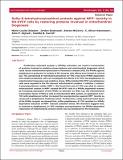Files in this item
Delta-9-tetrahydrocannabinol protects against MPP+ toxicity in SH-SY5Y cells by restoring proteins involved in mitochondrial biogenesis
Item metadata
| dc.contributor.author | Zeissler, Marie-Louise | |
| dc.contributor.author | Eastwood, Jordan | |
| dc.contributor.author | McCorry, Kieran | |
| dc.contributor.author | Hanemann, C. Oliver | |
| dc.contributor.author | Zajicek, John P. | |
| dc.contributor.author | Carroll, Camille B. | |
| dc.date.accessioned | 2016-08-16T13:30:14Z | |
| dc.date.available | 2016-08-16T13:30:14Z | |
| dc.date.issued | 2016-06-27 | |
| dc.identifier | 245056815 | |
| dc.identifier | ee73e0bf-c110-4a21-bce0-ed29e7cdd607 | |
| dc.identifier | 84979895378 | |
| dc.identifier | 000385402300134 | |
| dc.identifier.citation | Zeissler , M-L , Eastwood , J , McCorry , K , Hanemann , C O , Zajicek , J P & Carroll , C B 2016 , ' Delta-9-tetrahydrocannabinol protects against MPP + toxicity in SH-SY5Y cells by restoring proteins involved in mitochondrial biogenesis ' , Oncotarget , vol. 7 , no. 29 , pp. 46603-46614 . https://doi.org/10.18632/oncotarget.10314 | en |
| dc.identifier.issn | 1949-2553 | |
| dc.identifier.other | ORCID: /0000-0003-3481-825X/work/64034690 | |
| dc.identifier.uri | https://hdl.handle.net/10023/9313 | |
| dc.description | This project was supported through a studentship awarded by the Plymouth University Peninsula Schools of Medicine and Dentistry. | en |
| dc.description.abstract | Proliferator-activated receptor γ (PPARγ) activation can result in transcription of proteins involved in oxidative stress defence and mitochondrial biogenesis which could rescue mitochondrial dysfunction in Parkinson's disease (PD).The PPARγ agonist pioglitazone is protective in models of PD; however side effects have limited its clinical use. The cannabinoid Δ9-tetrahydrocannabinol (Δ9-THC) may have PPARγ dependent anti-oxidant properties. Here we investigate the effects of Δ9-THC and pioglitazone on mitochondrial biogenesis and oxidative stress. Differentiated SH-SY5Y neuroblastoma cells were exposed to the PD relevant mitochondrial complex 1 inhibitor 1-methyl- 4-phenylpyridinium iodide (MPP+). We found that only Δ9-THC was able to restore mitochondrial content in MPP+ treated SH-SY5Y cells in a PPARγ dependent manner by increasing expression of the PPARγ co-activator 1a (PGC-1a), the mitochondrial transcription factor (TFAM) as well as mitochondrial DNA content. Co-application of Δ9- THC with pioglitazone further increased the neuroprotection against MPP+ toxicity as compared to pioglitazone treatment alone. Furthermore, using lentiviral knock down of the PPARγ receptor we showed that, unlike pioglitazone, Δ9-THC resulted in a PPARγ dependent reduction of MPP+ induced oxidative stress. We therefore suggest that, in contrast to pioglitazone, Δ9-THC mediates neuroprotection via PPARγ-dependent restoration of mitochondrial content which may be beneficial for PD treatment. | |
| dc.format.extent | 12 | |
| dc.format.extent | 2214358 | |
| dc.language.iso | eng | |
| dc.relation.ispartof | Oncotarget | en |
| dc.subject | Mitochondrial biogenesis | en |
| dc.subject | MPP+ | en |
| dc.subject | Parkinson's disease | en |
| dc.subject | Peroxisome proliferator-activated receptor | en |
| dc.subject | Δ9-tetrahydrocannabinol | en |
| dc.subject | RC0254 Neoplasms. Tumors. Oncology (including Cancer) | en |
| dc.subject | Oncology | en |
| dc.subject | NDAS | en |
| dc.subject | SDG 3 - Good Health and Well-being | en |
| dc.subject.lcc | RC0254 | en |
| dc.title | Delta-9-tetrahydrocannabinol protects against MPP+ toxicity in SH-SY5Y cells by restoring proteins involved in mitochondrial biogenesis | en |
| dc.type | Journal article | en |
| dc.contributor.institution | University of St Andrews. School of Medicine | en |
| dc.identifier.doi | 10.18632/oncotarget.10314 | |
| dc.description.status | Peer reviewed | en |
| dc.identifier.url | http://www.scopus.com/inward/record.url?scp=84979895378&partnerID=8YFLogxK | en |
This item appears in the following Collection(s)
Items in the St Andrews Research Repository are protected by copyright, with all rights reserved, unless otherwise indicated.

